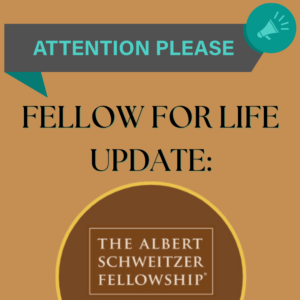By Jasmine E. Crenshaw
The Shift In Social Interaction for Older Adults
Older Americans, like Malik Seals’ grandmother, spent the early days of the COVID-19 pandemic trying to identify ways to keep in touch with their support systems and communities. Decreased in-person interactions between older adults and their communities have contributed to serious consequences for them, including increased anxiety, depression, and feelings of social isolation. “We struggled to find ways to help her feel more connected with her family and friends because there was [a] technical barrier”, the 2021 Alabama Schweitzer Fellow said, “I realized that my granny, like many older adults, did not grow up in a time period, which allowed them to gain the technical literacy skills that is all but required in today’s society.” A study conducted by AARP last fall concluded that many older adults purchased more technology products during the pandemic but still needed assistance in learning to operate them independently. Many programs and organizations, such as Generations on Line and Cyber-Seniors, have existed prior to the pandemic with the goal of helping older citizens build and strengthen their technology skills but have seen increased interest in their work throughout the pandemic. By increasing their technology skillset, older adults have regained some normalcy through being able to communicate with their loved ones virtually. Malik’s Schweitzer project aims to ensure that older adults like his grandmother can learn and use their improved technology skills to safely connect to their communities.
Increasing Technology Skills for His Project Population
Malik’s community site partner, Collat Jewish Family Services, provides a multitude of programs to its older patrons and their families, including online caregiver support groups. By partnering with the organization, he has connected and worked with older adults who may have experienced bouts of loneliness and social isolation, especially during the pandemic. Many of his project participants are residents of assisted living communities, where most experienced social interactions through in-person, community gatherings. Malik’s project has two elements: (1) building the level of competency in navigating and mastering technology platforms, such as Zoom, and (2) facilitating opportunities and events for participants to safely interact with others. As Malik is currently working with his first participant cohort, he is working towards his ultimate goal for them. “The ultimate goal is for the participants to gain familiarity with and embrace modern communication technologies and understand how to use these platforms to stay connected with their loved ones and peers.”, the UAB Biomedical Sciences program student said. By harnessing these skills, Malik’s participants will join the group of older Americans who have become increasingly more technology-savvy.
Lessons Learned And His Future
This month marks the six-month point for Malik and the rest of his 2021 Alabama Schweitzer Fellow cohort. Malik noted how surprised he has been both by the amount of flexibility needed to carry out a successful Schweitzer project and by the openness of his project participants. “I’ve also been surprised by [how] open the participants are with their desires for learning how to navigate the role of technology in their lives”, he affirmed. When he first began his Schweitzer project, he quickly realized that it benefitted the project more if he adapted it to the participants’ needs rather than planning it without them in mind. Malik also became cognizant of how his project and his coursework in the UAB Biomedical Sciences program had him working independently with limited social interaction; he has since worked to increase his social interactions.
In addition to Malik being a 2021 ASF Fellow, he will be studying issues surrounding multiple sclerosis as a Fulbright Scholar in Berlin, Germany starting this semester. As he begins his Fulbright Scholarship, he is aware of the lessons he has learned so far as a Schweitzer Fellow, including learning more about humility. “My project often requires me to have enough humility to ask my participants if my methods are working for them, and whether or not they are actually learning the content”, Malik said, “Also, my ASF project has allowed me to work with a community in which I had no previous experience, so I was forced to enter each conversation without making assumptions and actually listen to learn.” Continuing with his Schweitzer project, he hopes that social isolation and loneliness among older adults will be taken more seriously by clinicians and health care professionals alike in the future. But he believes that the first step for this to occur will be for all citizens to acknowledge this issue as a public health concern.



